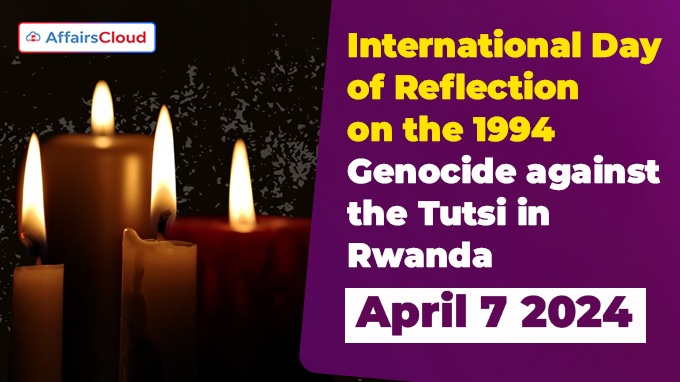 The United Nations (UN)’s International Day of Reflection on the 1994 Genocide against the Tutsi in Rwanda is annually observed across the globe on 7th April to honour the memory of the victims, who perished during the 1994 genocide.
The United Nations (UN)’s International Day of Reflection on the 1994 Genocide against the Tutsi in Rwanda is annually observed across the globe on 7th April to honour the memory of the victims, who perished during the 1994 genocide.
- The Day serves as a reminder of the profound loss suffered by the Tutsi community, as well as Hutus and others who opposed the genocide.
7th April 2024 marks the 30th anniversary of the genocide against the Tutsi in 1994 in Rwanda.
Background:
i.On 23rd December 2003, the UN General Assembly (UNGA) adopted the resolution A/RES/58/234, designating 7th April of every year as the International Day of Reflection on the Genocide in Rwanda.
ii.The first ever International Day of Reflection on the Genocide in Rwanda was observed on 7th April 2004, which marked the 10th anniversary of the 1994 genocide in Rwanda.
Title of the Annual Observance Amended:
i.On 26th January 2018, the UNGA adopted a draft resolution A/72/L.31, designating 7th April as the International Day of Reflection on the 1994 Genocide against the Tutsi in Rwanda.
ii.On 20th April 2020, the UNGA adopted the resolution A/RES/74/273 and:
- Reaffirmed the 7 April as the International Day of Reflection on the 1994 Genocide against the Tutsi in Rwanda;
- Also modified the title of the outreach programme to “outreach programme on the 1994 genocide against the Tutsi in Rwanda and the United Nations.”
1994 Rwandan Genocide:
i.The date, 7 April, marks the beginning of the 1994 genocide which lasted for 100 days till 15th July 1994.
ii.Tragic Events: The genocide saw the systematic murder of over 1 million Tutsi individuals by the Hutu extremist-led government in just over 100 days.
iii.Victims: The victims were not only Tutsi but also included moderate Hutu and others who opposed the massacres.
Commemorative Events:
Every year, on or around 7 April, the UN organises commemorative events at its Headquarters in New York, United States of America (USA) and at UN offices around the world.
UNESCO’s Mission:
i.The United Nations Educational, Scientific and Cultural Organization (UNESCO) is dedicated to fostering education about genocides.
ii.It aims to sensitise learners about the causes, dynamics, and consequences of such crimes and works to strengthen resilience against all forms of discrimination.
iii.In 2023, UNESCO’s World Heritage Committee recognised 4 genocide memorial sites in Rwanda to the list of World Heritage Sites: Nyamata, Murambi, Bisesero, and Gisozi, where the Kigali Genocide Memorial is located.
2024 Events:
i.Marking the 30th anniversary of the Genocide against the Tutsi in Rwanda, UNESCO commissioned an exhibition “Remembering the Genocide of the Tutsi,” from 5 April 2024 to 31 May 2024 at UNESCO Headquarters, Paris, France.
- The exhibition explores the landscape of each of the 4 sites through individual experiences.
ii.This exhibition created in 2024 by the Aegis Trust, runs the Kigali Genocide Memorial on behalf of Rwanda’s Ministry of National Unity and Civic Engagement.
iii.On 7 April 2024, UNESCO organised a ceremony in cooperation with the Permanent Delegation of Rwanda to UNESCO and Ibuka France in Paris, France.




